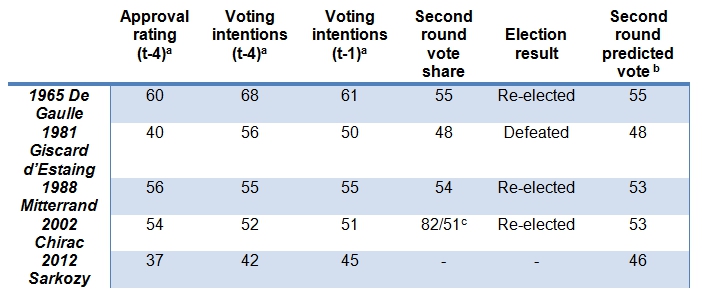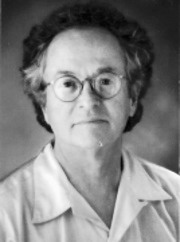Thomas Didier, Richard Nadeau and Michael S Lewis-Beck examine the 2012 French presidential election from two standpoints: first, a retrospective dimension emphasizes the burden of Sarkozy’s poor record as a president. Second, a prospective dimension highlights how Sarkozy’s image is playing in his favour – but not enough to secure a victory.
A way to predict the outcome of the second-round in the next presidential election is to compare the political context a few months before the previous ‘incumbent elections’ in France (1965, 1981, 1988 and 2002) with the one prevailing ahead of the 2012 election. This retrospective comparison is shown in Table 1.
Table 1. Approval ratings and voting intentions for incumbent candidates in French presidential elections, 1965, 1981, 1988, 2002 and 2012.

a (t-x) indicate months before the election.
c See our article for the methodology.
c In 2002, we use the average of polls taken during the month of April (51%), just before the second round, as a proxy for Chirac’s second round vote share in our regression analysis. Sources: IFOP polls (approval ratings); TNS SOFRES (voting intentions in 1981, 1988, 2002, 2007; mean of available polls for 2012); Stoetzel (1966) for 1965 data; and official data (second round vote shares).
A second visible trend is that electoral campaigns appear to have a corrective effect on voting intentions. Indeed, voting intentions for leading candidates seem to decrease over the duration of the campaign, demonstrating that the approval rating of presidents is a more accurate predictor of the second round vote than voting intentions 4 months before the election. For all cases presented in Table 1 (using 51% as a proxy for Chirac’s support in 2002, see explanation below Table 1), voting intentions four months before the election (column 2) appear inflated compared with the outcome of the elections (column 4). Electoral campaigns thus seem to have a deflationary effect on voting intentions for the leading candidate in these incumbent contests.
These campaign adjustments can be explained by the notion of the ‘expected vote’ developed by Holbrook (1996). According to him, the evolution of voting intentions during campaigns depends on the distance between the candidate support in the polls and the expected support the candidate should receive, given the circumstances of an election, in particular the economic circumstances. If poll support for a candidate appears ‘too high’ in the pre-election months, given the state of the economy, then support would evolve downward, converging at election time to its expected level.
We test Holbrook’s idea by comparing the predicted vote for the incumbents and the level of approval measured four months before the election (details here). On the basis of this model, the forecast for Sarkozy’s vote in the second round is 46%, a level very close to his current support in the polls (45%). So far, the model has captured the narrowing margin between Hollande and Sarkozy, as the latter’s voting intentions increased from 42% in December 2011 to 45% in late March 2012. The moderate but steady decline of voting intentions Hollande has experienced since his peak following the socialist primaries in October 2011 (when he reached 63% of second round voting intentions) are an indication that his support in October was ‘too high’ (just as for de Gaulle in 1965 and Giscard d’Estaing in 1981).
Elections, however, are not entirely determined four months before the election. Over the duration of the campaign voters will compare the candidates and figure out ‘the best person’ to address the important issues of the forthcoming years. Examining how voters perceive the image of candidates adds a prospective layer on the analysis.
Some additional insight can be drawn from this prospective dimension of the vote. The images of Sarkozy and Hollande conform to the ideological stereotypes described by Lewis-Beck et al (2011, Chapter 6) and Nadeau et al, 2011. According to an Ipsos-Logica poll conducted in November 2011, Hollande is more honest and sympathetic while Sarkozy is the most dynamic and has more of the “right stuff” to be president, or étoffe présidentielle in French. However, Nicolas Sarkozy seems to have lost the trait these authors view as the most important characteristic for French presidential candidates: competence. While Sarkozy was viewed as the most competent candidate in the 2007 election against Ségolène Royal, in the same poll Sakorzy was viewed as competent by only 49% of respondents, compared to 59% for Hollande.
Since Sarkozy is the current president, his competence can be interpreted as an evaluation of his past record, and throughout the campaign the chief concern of voters – the dominant theme in the incumbent’s record – is economic management. In the November 2011 IPSOS–Logica poll, the economic and financial crisis is the single most important issue on the voters’ agenda (48%), followed by three other economic topics – unemployment (33%), public deficits (29%) and purchasing power (26%). Similarly, in a March 2012 OpinionWay poll, purchasing power (43%) and employment (42%) remain voters’ most important issues (the economic crisis is not among the available choices in the latter poll).
In the domain of economic management, Sarkozy’s record may have cost him his image as the most competent leader, but the UMP candidate still has a card up his sleeve: he dominates Hollande as most capable of navigating France through the troubled water of the Euro Zone crisis. OpinionWay figures show that president Sarkozy is the most capable of taking good decisions facing the current economic and financial crisis (39% against 31% for Hollande) as well as the most capable of taking difficult decisions (50% against 27%) – and this trend is constant throughout the campaign.
In our view, Sarkozy’s image as a strong leader may continue playing in his favour in the month ahead to reach the additional percentage point needed to reach our forecasted 46% vote share, but will not be sufficient to secure a victory in the second round. According to a mid-March BVA poll, François Hollande still has a strong lead over Sarkozy as the most credible in handling unemployment (58% against 32%) and purchasing power (58% against 31%), two issues at the top of the electorate’s priorities – and issues on which Royal and Sarkozy were about at par in 2007.
A more comprehensive forecast to the French presidential elections is published here.
Please read our comments policy before commenting.
Note: This article gives the views of the author, and not the position of EUROPP – European Politics and Policy, nor of the London School of Economics.
_________________________________________
 Thomas Didier – Risques Géopolitiques
Thomas Didier – Risques Géopolitiques
Thomas Didier is currently political risk analyst for an institutional investment fund. He has previously worked at Foreign Affairs Canada, the Montreal Council on Foreign Relations and Export Development Canada. His research interests include electoral studies, latin american politics and the political economy of natural resources. Thomas recently graduated from McGill University with an MA in political science.
 Richard Nadeau – University of Montreal
Richard Nadeau – University of Montreal
Richard Nadeau is Professor of Political Science at the University of Montreal, Canada. His interests are voting behaviour, public opinion, political communication and quantitative methodology. The former chief advisor to Prime Minister of Quebec has authored or co-authored over 120 articles, chapters and books including Unsteady State and The Anatomy of a Liberal Victory.
 Michael Lewis-Beck – University of Iowa
Michael Lewis-Beck – University of Iowa
Michael Lewis-Beck is F. Wendell Miller Distinguished Professor of Political Science at the University of Iowa, USA. His main interests are comparative elections, forecasting, political economy and quantitative methodology. He has authored or co-authored over 180 articles and books, including American Voter Revisited and Applied Regression: An Introduction.


